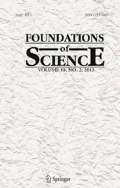Abstract
A survey of the main approaches in a mind study -oriented part of Artificial Intelligence is made focusing on controversial issues and extreme hypotheses. Various meanings of terms: "intelligence" and "artificial intelligence" are discussed. Limitations for constructing intelligent systems resulting from the lack of formalized models of cognitive activity are shown. The approaches surveyed are then recapitulated in the light of these limitations.
Similar content being viewed by others
References
Aquinas, St. Thomas (1948), The Summa Theologica, English transl. New York.
Bocheński, J.M. (1954), Die zeitgenossischen Denkmethoden, Bern: A. Francke AG Verlag.
Chomsky, N. (1965), Aspects of the Theory of Syntax, Cambridge: MIT Press.
Dreyfus, H.L. (1988) ‘Misrepresenting human intelligence’, in: Born, B. (ed.), Artificial Intelligence. The Case Against, London: Routledge.
Firebaugh, M.W. (1988), Artificial Intelligence. A Knowledge-Based Approach, Boston: PWS-Kent Publ. Comp.
Kanal, L.N. (1993), ‘On pattern, categories and alternate realities’, Pattern Recognition Letters, 14, 241–255.
Lakoff, G. (1987), Women, Fire and Dangerous Things, Chicago: The University of Chicago Press.
Langacker, R.W. (1987), Foundations of Cognitive Grammar, Stanford: Stanford University Press.
McCarthy, J. (1979), ‘Ascribing mental qualities to machines’, in: Ringle, M. (ed.), Philosophical Perspectives of Artificial Intelligence, Brighton, 1979.
Mc Corduck, P. (1979), Machines Who Think, San Francisco, CA: W.H. Freeman and Comp.
Minsky, M., Papert, S. (1969), Perceptrons — An Introduction to Computational Gcomctry, Cambridge, MA: The MIT Press.
Newell, A., Simon, H.A. (1976), ‘Computer science as empirical inquiry: symbols and search’, Communications of the Association for Computing Machinery 19 (March 1976).
Penrose, R. (1989), The Emperor's New Mind, Oxford: Oxford University Press.
Rosch, E. (1978), ‘Principles of categorization’, in: Rosch, E. Lloyd, B. (eds.), Cognition and Categorization, Hillsdale, NJ: Lawrence Erlbaum Associates Publ.
Rosenblatt, F. (1962), Principles of Neurodynamics, New York, NY: Spartan Books.
Schank, R.C., Abelson, R.P. (1977), Scripts, Plans, Goals, and Understanding, Hillsdale, NJ: Lawrence Erlbaum Associates Publ.
Searle, J.R. (1980), ‘Minds, brains and programs’, The Behavioral and Brain Sciences 3, 417–457.
Simon, H.A. (1984), ‘Why should machines learn?’, in: Michalski, R.S., Carbonell J.G., Mitchell, T.M. (eds.), Machine Learning: Artificial Intelligence Approach, Berlin: Springer Verlag.
Turing, A.M. (1950), ‘Computing machinery and intelligence’, Mind, 59, no 236.
Watson, J.B. (1919), Psychology from the Standpoint of a Behaviourist.
Winograd, T. (1987), ‘Thinking machines: Can there be? Are we?’, in: Winograd, T., Flores, C.F. (eds.), Understanding Computers and Cognition: A New Foundation for Design, Addison-Wesley.
Winston, P.H. (1992), Artificial Intelligence, Reading, MA: Addison-Wesley.
Wittgenstein, L. (1953), Philosophical Investigations, New York: Macmillan.
Author information
Authors and Affiliations
Rights and permissions
About this article
Cite this article
Flasiński, M. "Every Man in His Notions" or Alchemists' Discussion on Artificial Intelligence. Foundations of Science 2, 107–121 (1997). https://doi.org/10.1023/A:1009687513096
Issue Date:
DOI: https://doi.org/10.1023/A:1009687513096




